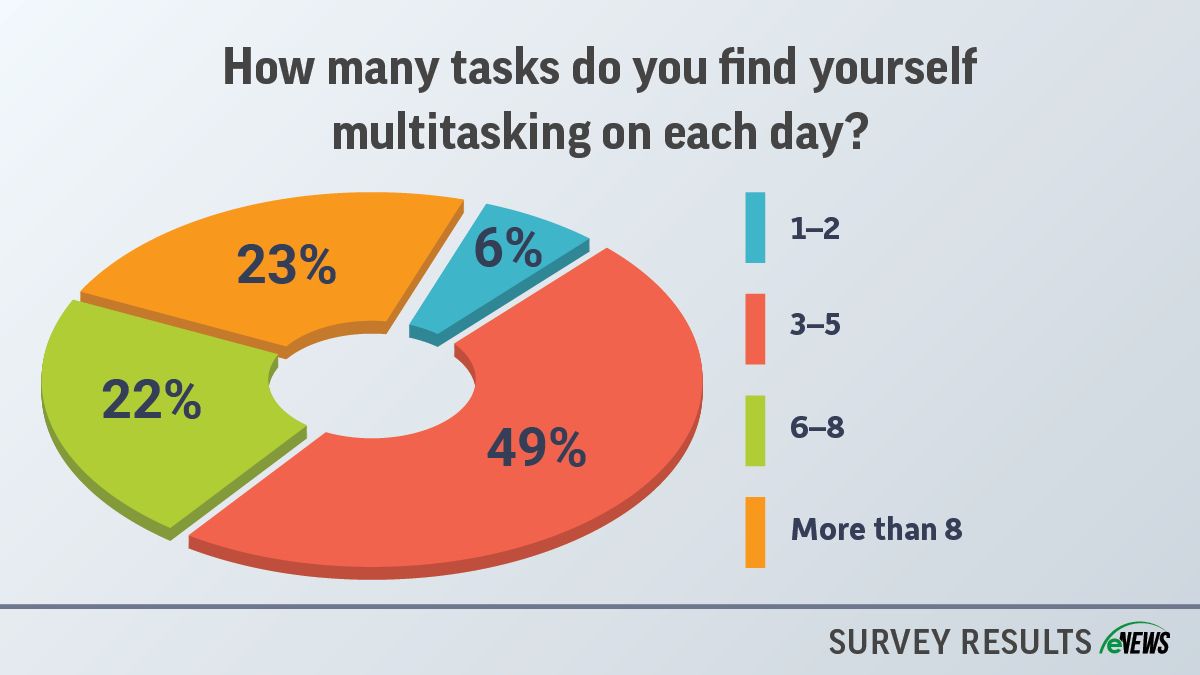Business Practices, eNews, Leadership
The truth about multitasking

In today’s fast-paced business world, multitasking has become a key skill for professionals across industries. Multitasking is the ability to perform multiple tasks at the same time. It can sometimes look like juggling meetings or handling various projects both big and small.
Why it matters: When done effectively, multitasking can be a beautiful thing—and in some cases can even set you apart from others. It saves time, assists others, and helps manage personal responsibilities. Credit managers often face numerous, sometimes unexpected, tasks daily. However, learning to multitask has both benefits and drawbacks.
Yes, but: Multitasking can take a toll on overall productivity as our brains tend to lack the ability to perform multiple tasks at once. It can impair executive function, slow you down significantly, be a distraction and make you more prone to careless mistakes. You might think you are multitasking effectively when you are losing the quality of work by not focusing on one task.
However, there is a way to multitask the “right” way. It’s not only about doing multiple things at once; it’s about managing your time wisely to maintain high standards of productivity and quality.
By the numbers:
- According to a recent NACM eNews poll, 49% of credit managers multitask between three and five tasks each day, while 22% multitask six to eight and 23% juggle more than eight tasks.
- Only 6% of credit professionals say they multitask just one to two tasks daily.
- 92% of workers spend time multitasking during virtual meetings and 72% of employees feel pressure to multitask during the working day.
Some of the most commonly multitasked responsibilities include office interruptions, emails, customer accounts, collections and more.
What they’re saying: “You have to give an adequate amount of attention to each task,” said Patricia Crisman, CBA, accounting associate at Steelscape (Kalama, WA). “Work and life don’t happen in a bubble. The important part is knowing when something needs your full attention and being able to step back, focus and complete the task at hand. Then, jumping back into managing the multiple tasks necessary. That is where prioritizing comes in.”
As someone who multitasks more than six tasks daily, Crisman’s priority skills are used the most. “A task that takes less than five minutes should be done right then,” she said. “If it’s a five-to-15-minute task, create a reminder in Outlook or on a Post-it. For anything that needs more than 15 minutes and needs full attention, put it on your calendar and block off that time. I also set some focus time every day in outlook so that I am not bombarded with emails and Teams messages and can work on my necessary daily items.”
Some credit professionals think multitasking can be based on comfort level as well. Where one team member may be comfortable with splitting their focus, another may not work to the best of their ability.
“If you’re validating numbers or reading a contract, you have to have that undivided focus,” said Janine Sabo, CCE, NACM Board director and corporate credit manager at Branscome Operating LLC (Williamsburg, VA). “In the credit world, we’re trying to collect money, review contracts or review purchase orders. We’re making sure the pricing is right and dealing with our sales team. So, it’s not unusual to have all of those things happening simultaneously in a day. Knowing your level of comfort with those things helps with which tasks require the 100% versus the others you can continue to multitask while you’re working on it.”
Another task that can be hard to juggle is timely responses to customers. Tedious tasks tend to be more difficult to not give 100% of your focus to—and if not balanced correctly, can lead to typos in emails or small mistakes. “Payment issues related to COD or credit holds tend to get priority,” said Phillip Stoltzfus, CBA, CCRA, controller at AB Martin Roofing Supply (Ephrata, PA). “Otherwise, tasks that can be completed quickly are completed so I can get back to larger projects.”
The bottom line: Though multitasking is a common practice in the business credit world, it will always require careful management to ensure productivity and quality of work are not compromised.





